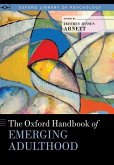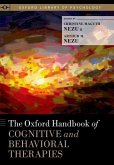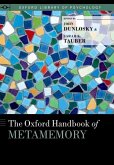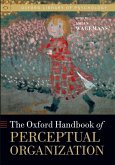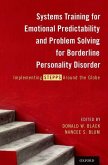Oxford Handbook of Emotion, Social Cognition, and Problem Solving in Adulthood
Herausgeber: Verhaeghen, Paul; Hertzog, Christopher
Oxford Handbook of Emotion, Social Cognition, and Problem Solving in Adulthood
Herausgeber: Verhaeghen, Paul; Hertzog, Christopher
- Gebundenes Buch
- Merkliste
- Auf die Merkliste
- Bewerten Bewerten
- Teilen
- Produkt teilen
- Produkterinnerung
- Produkterinnerung
The Oxford Handbook of Emotion, Social Cognition, and Problem Solving in Adulthood provides the first overview of a new field of adult development that has emerged out of conceptualizations and research at the intersections between socioemotional development, social cognition, emotion, coping, and everyday problem solving.
Andere Kunden interessierten sich auch für
![The Oxford Handbook of Emerging Adulthood The Oxford Handbook of Emerging Adulthood]() The Oxford Handbook of Emerging Adulthood332,99 €
The Oxford Handbook of Emerging Adulthood332,99 €![Society, Science, and Problem-Solving Courts Society, Science, and Problem-Solving Courts]() Monica K MillerSociety, Science, and Problem-Solving Courts69,99 €
Monica K MillerSociety, Science, and Problem-Solving Courts69,99 €![Oxford Handbook of Internet Psychology Oxford Handbook of Internet Psychology]() Adam Joinson / Katelyn McKenna / Tom Postmes / Ulf-Dietrich Reips (eds.)Oxford Handbook of Internet Psychology138,99 €
Adam Joinson / Katelyn McKenna / Tom Postmes / Ulf-Dietrich Reips (eds.)Oxford Handbook of Internet Psychology138,99 €![The Oxford Handbook of Cognitive and Behavioral Therapies The Oxford Handbook of Cognitive and Behavioral Therapies]() The Oxford Handbook of Cognitive and Behavioral Therapies251,99 €
The Oxford Handbook of Cognitive and Behavioral Therapies251,99 €![The Oxford Handbook of Metamemory The Oxford Handbook of Metamemory]() The Oxford Handbook of Metamemory251,99 €
The Oxford Handbook of Metamemory251,99 €![The Oxford Handbook of Perceptual Organization The Oxford Handbook of Perceptual Organization]() The Oxford Handbook of Perceptual Organization234,99 €
The Oxford Handbook of Perceptual Organization234,99 €![Systems Training for Emotional Predictability and Problem Solving for Borderline Personality Disorder Systems Training for Emotional Predictability and Problem Solving for Borderline Personality Disorder]() Systems Training for Emotional Predictability and Problem Solving for Borderline Personality Disorder126,99 €
Systems Training for Emotional Predictability and Problem Solving for Borderline Personality Disorder126,99 €-
-
-
The Oxford Handbook of Emotion, Social Cognition, and Problem Solving in Adulthood provides the first overview of a new field of adult development that has emerged out of conceptualizations and research at the intersections between socioemotional development, social cognition, emotion, coping, and everyday problem solving.
Hinweis: Dieser Artikel kann nur an eine deutsche Lieferadresse ausgeliefert werden.
Hinweis: Dieser Artikel kann nur an eine deutsche Lieferadresse ausgeliefert werden.
Produktdetails
- Produktdetails
- Verlag: Oxford University Press
- Seitenzahl: 352
- Erscheinungstermin: 17. April 2014
- Englisch
- Abmessung: 257mm x 180mm x 25mm
- Gewicht: 794g
- ISBN-13: 9780199899463
- ISBN-10: 0199899460
- Artikelnr.: 40397996
- Herstellerkennzeichnung
- Libri GmbH
- Europaallee 1
- 36244 Bad Hersfeld
- gpsr@libri.de
- Verlag: Oxford University Press
- Seitenzahl: 352
- Erscheinungstermin: 17. April 2014
- Englisch
- Abmessung: 257mm x 180mm x 25mm
- Gewicht: 794g
- ISBN-13: 9780199899463
- ISBN-10: 0199899460
- Artikelnr.: 40397996
- Herstellerkennzeichnung
- Libri GmbH
- Europaallee 1
- 36244 Bad Hersfeld
- gpsr@libri.de
Paul Verhaeghen, Ph.D., is a Professor of Psychology at Georgia Institute of Technology. He is interested in working memory, attention, executive control, creativity, aging, and the interfaces between them. Christopher K. Hertzog, Ph.D., is a Professor of Psychology at Georgia Institute of Technology. He specializes in adult development and aging, with an emphasis on understanding individual differences in cognitive changes in old age and variables that can help predict and explain successful cognitive aging, including health, lifestyle, and adaptive self-regulation.
* 1. Introduction
* Paul Verhaeghen and Christopher K. Hertzog
* Part One: Emotion during Adulthood
* 2. Older Adults' Perception of Social and Emotional Cues
* Louise H. Phillips, Gillian Slessor, Phoebe E. Bailey, and Julie D.
Henry
* 3. The Effects of Age on Memory for Socio-Emotional Material: An
Affective Neuroscience Perspective
* Elizabeth A. Kensinger, Eric R. Allard, and Anne C. Krendl
* 4. Age Changes in Facial Morphology, Emotional Communication, and Age
Stereotyping
* Mary Lee Hummert
* 5. Do Everyday Affective Experiences Differ Throughout Adulthood? A
Review of Ambulatory-Assessment Evidence
* Michaela Riediger and Antje Rauers
* Part Two: Emotion in Context: Antecedents and Consequences
* 6. The Dynamics of Cognitive-Emotional Integration: Complexity and
Hedonics in Emotional Development
* Gisela Labouvie-Vief, Anne-Laure Gilet, and Nathalie Mell
* 7. Putting Emotional Aging in Context: Contextual Influences on
Age-Related Changes in Emotion Regulation and Recognition
* Jennifer Tehan Stanley and Derek M. Isaacowitz
* 8. Positive Emotions and Health in Adulthood and Later Life
* Catherine Riffin, Anthony D. Ong, and C. S. Bergeman
* 9. Boundary Conditions for Emotional Well-being in Aging: The
Importance of Daily Stress
* Martin J. Sliwinski and Stacey B. Scott
* 10. Tasks, Capacities, and Tactics: A Skill-based Conceptualization
of Emotion Regulation across the Lifespan
* Nathan S. Consedine and Iris Mauss
* 11. Reconciling Cognitive Decline and Increased Well-being with Age:
The Role of Increased Emotion Regulation Efficiency
* Erin Senesac and Susanne Scheibe
* Part Three: Everyday Problem Solving
* 12. Contextual Variation in Adults' Emotion Regulation During
Everyday Problem Solving
* Michelle A. Skinner, Cynthia A. Berg, and Bert N. Uchino
* 13. Goals and Strategies for Solving Interpersonal Everyday Problems
across the Life Span
* JoNell Strough and Emily J. Keener
* 14. Goals, Strategies, and Well-Being across Adulthood: Integrating
Perspectives from the Coping and Everyday Problem-Solving Literatures
* Abby Heckman Coats, Christiane Hoppmann, and Stacey B. Scott
* Part Four: Social Cognition and Goals
*
* 15. My Heart Will Go On: Aging and Autonomic Nervous System
Responding in Emotion
* Michelle N. Shiota and Samantha L. Neufeld
* 16. Aging Influences on Judgment and Decision Processes: Interactions
between Ability and Experience
* Thomas M. Hess and Tara L. Queen
*
* 17. Wisdom and Emotions
* Monika Ardelt and Michel Ferrari
* 18. Values across Adulthood: A Neglected Developmental Construct
Guiding Thought and
* Action over Time
* Johannes O. Ritter and Alexandra M. Freund
* 19. Causal Attributions across the Adult Lifespan
* Michelle Horhota, Andrew Mienaltowski, and Yiwei Chen
* 20. Stereotype threat in older adults: When and why does it occur and
who is most affected?
* Sarah J. Barber and Mara Mather
* Paul Verhaeghen and Christopher K. Hertzog
* Part One: Emotion during Adulthood
* 2. Older Adults' Perception of Social and Emotional Cues
* Louise H. Phillips, Gillian Slessor, Phoebe E. Bailey, and Julie D.
Henry
* 3. The Effects of Age on Memory for Socio-Emotional Material: An
Affective Neuroscience Perspective
* Elizabeth A. Kensinger, Eric R. Allard, and Anne C. Krendl
* 4. Age Changes in Facial Morphology, Emotional Communication, and Age
Stereotyping
* Mary Lee Hummert
* 5. Do Everyday Affective Experiences Differ Throughout Adulthood? A
Review of Ambulatory-Assessment Evidence
* Michaela Riediger and Antje Rauers
* Part Two: Emotion in Context: Antecedents and Consequences
* 6. The Dynamics of Cognitive-Emotional Integration: Complexity and
Hedonics in Emotional Development
* Gisela Labouvie-Vief, Anne-Laure Gilet, and Nathalie Mell
* 7. Putting Emotional Aging in Context: Contextual Influences on
Age-Related Changes in Emotion Regulation and Recognition
* Jennifer Tehan Stanley and Derek M. Isaacowitz
* 8. Positive Emotions and Health in Adulthood and Later Life
* Catherine Riffin, Anthony D. Ong, and C. S. Bergeman
* 9. Boundary Conditions for Emotional Well-being in Aging: The
Importance of Daily Stress
* Martin J. Sliwinski and Stacey B. Scott
* 10. Tasks, Capacities, and Tactics: A Skill-based Conceptualization
of Emotion Regulation across the Lifespan
* Nathan S. Consedine and Iris Mauss
* 11. Reconciling Cognitive Decline and Increased Well-being with Age:
The Role of Increased Emotion Regulation Efficiency
* Erin Senesac and Susanne Scheibe
* Part Three: Everyday Problem Solving
* 12. Contextual Variation in Adults' Emotion Regulation During
Everyday Problem Solving
* Michelle A. Skinner, Cynthia A. Berg, and Bert N. Uchino
* 13. Goals and Strategies for Solving Interpersonal Everyday Problems
across the Life Span
* JoNell Strough and Emily J. Keener
* 14. Goals, Strategies, and Well-Being across Adulthood: Integrating
Perspectives from the Coping and Everyday Problem-Solving Literatures
* Abby Heckman Coats, Christiane Hoppmann, and Stacey B. Scott
* Part Four: Social Cognition and Goals
*
* 15. My Heart Will Go On: Aging and Autonomic Nervous System
Responding in Emotion
* Michelle N. Shiota and Samantha L. Neufeld
* 16. Aging Influences on Judgment and Decision Processes: Interactions
between Ability and Experience
* Thomas M. Hess and Tara L. Queen
*
* 17. Wisdom and Emotions
* Monika Ardelt and Michel Ferrari
* 18. Values across Adulthood: A Neglected Developmental Construct
Guiding Thought and
* Action over Time
* Johannes O. Ritter and Alexandra M. Freund
* 19. Causal Attributions across the Adult Lifespan
* Michelle Horhota, Andrew Mienaltowski, and Yiwei Chen
* 20. Stereotype threat in older adults: When and why does it occur and
who is most affected?
* Sarah J. Barber and Mara Mather
* 1. Introduction
* Paul Verhaeghen and Christopher K. Hertzog
* Part One: Emotion during Adulthood
* 2. Older Adults' Perception of Social and Emotional Cues
* Louise H. Phillips, Gillian Slessor, Phoebe E. Bailey, and Julie D.
Henry
* 3. The Effects of Age on Memory for Socio-Emotional Material: An
Affective Neuroscience Perspective
* Elizabeth A. Kensinger, Eric R. Allard, and Anne C. Krendl
* 4. Age Changes in Facial Morphology, Emotional Communication, and Age
Stereotyping
* Mary Lee Hummert
* 5. Do Everyday Affective Experiences Differ Throughout Adulthood? A
Review of Ambulatory-Assessment Evidence
* Michaela Riediger and Antje Rauers
* Part Two: Emotion in Context: Antecedents and Consequences
* 6. The Dynamics of Cognitive-Emotional Integration: Complexity and
Hedonics in Emotional Development
* Gisela Labouvie-Vief, Anne-Laure Gilet, and Nathalie Mell
* 7. Putting Emotional Aging in Context: Contextual Influences on
Age-Related Changes in Emotion Regulation and Recognition
* Jennifer Tehan Stanley and Derek M. Isaacowitz
* 8. Positive Emotions and Health in Adulthood and Later Life
* Catherine Riffin, Anthony D. Ong, and C. S. Bergeman
* 9. Boundary Conditions for Emotional Well-being in Aging: The
Importance of Daily Stress
* Martin J. Sliwinski and Stacey B. Scott
* 10. Tasks, Capacities, and Tactics: A Skill-based Conceptualization
of Emotion Regulation across the Lifespan
* Nathan S. Consedine and Iris Mauss
* 11. Reconciling Cognitive Decline and Increased Well-being with Age:
The Role of Increased Emotion Regulation Efficiency
* Erin Senesac and Susanne Scheibe
* Part Three: Everyday Problem Solving
* 12. Contextual Variation in Adults' Emotion Regulation During
Everyday Problem Solving
* Michelle A. Skinner, Cynthia A. Berg, and Bert N. Uchino
* 13. Goals and Strategies for Solving Interpersonal Everyday Problems
across the Life Span
* JoNell Strough and Emily J. Keener
* 14. Goals, Strategies, and Well-Being across Adulthood: Integrating
Perspectives from the Coping and Everyday Problem-Solving Literatures
* Abby Heckman Coats, Christiane Hoppmann, and Stacey B. Scott
* Part Four: Social Cognition and Goals
*
* 15. My Heart Will Go On: Aging and Autonomic Nervous System
Responding in Emotion
* Michelle N. Shiota and Samantha L. Neufeld
* 16. Aging Influences on Judgment and Decision Processes: Interactions
between Ability and Experience
* Thomas M. Hess and Tara L. Queen
*
* 17. Wisdom and Emotions
* Monika Ardelt and Michel Ferrari
* 18. Values across Adulthood: A Neglected Developmental Construct
Guiding Thought and
* Action over Time
* Johannes O. Ritter and Alexandra M. Freund
* 19. Causal Attributions across the Adult Lifespan
* Michelle Horhota, Andrew Mienaltowski, and Yiwei Chen
* 20. Stereotype threat in older adults: When and why does it occur and
who is most affected?
* Sarah J. Barber and Mara Mather
* Paul Verhaeghen and Christopher K. Hertzog
* Part One: Emotion during Adulthood
* 2. Older Adults' Perception of Social and Emotional Cues
* Louise H. Phillips, Gillian Slessor, Phoebe E. Bailey, and Julie D.
Henry
* 3. The Effects of Age on Memory for Socio-Emotional Material: An
Affective Neuroscience Perspective
* Elizabeth A. Kensinger, Eric R. Allard, and Anne C. Krendl
* 4. Age Changes in Facial Morphology, Emotional Communication, and Age
Stereotyping
* Mary Lee Hummert
* 5. Do Everyday Affective Experiences Differ Throughout Adulthood? A
Review of Ambulatory-Assessment Evidence
* Michaela Riediger and Antje Rauers
* Part Two: Emotion in Context: Antecedents and Consequences
* 6. The Dynamics of Cognitive-Emotional Integration: Complexity and
Hedonics in Emotional Development
* Gisela Labouvie-Vief, Anne-Laure Gilet, and Nathalie Mell
* 7. Putting Emotional Aging in Context: Contextual Influences on
Age-Related Changes in Emotion Regulation and Recognition
* Jennifer Tehan Stanley and Derek M. Isaacowitz
* 8. Positive Emotions and Health in Adulthood and Later Life
* Catherine Riffin, Anthony D. Ong, and C. S. Bergeman
* 9. Boundary Conditions for Emotional Well-being in Aging: The
Importance of Daily Stress
* Martin J. Sliwinski and Stacey B. Scott
* 10. Tasks, Capacities, and Tactics: A Skill-based Conceptualization
of Emotion Regulation across the Lifespan
* Nathan S. Consedine and Iris Mauss
* 11. Reconciling Cognitive Decline and Increased Well-being with Age:
The Role of Increased Emotion Regulation Efficiency
* Erin Senesac and Susanne Scheibe
* Part Three: Everyday Problem Solving
* 12. Contextual Variation in Adults' Emotion Regulation During
Everyday Problem Solving
* Michelle A. Skinner, Cynthia A. Berg, and Bert N. Uchino
* 13. Goals and Strategies for Solving Interpersonal Everyday Problems
across the Life Span
* JoNell Strough and Emily J. Keener
* 14. Goals, Strategies, and Well-Being across Adulthood: Integrating
Perspectives from the Coping and Everyday Problem-Solving Literatures
* Abby Heckman Coats, Christiane Hoppmann, and Stacey B. Scott
* Part Four: Social Cognition and Goals
*
* 15. My Heart Will Go On: Aging and Autonomic Nervous System
Responding in Emotion
* Michelle N. Shiota and Samantha L. Neufeld
* 16. Aging Influences on Judgment and Decision Processes: Interactions
between Ability and Experience
* Thomas M. Hess and Tara L. Queen
*
* 17. Wisdom and Emotions
* Monika Ardelt and Michel Ferrari
* 18. Values across Adulthood: A Neglected Developmental Construct
Guiding Thought and
* Action over Time
* Johannes O. Ritter and Alexandra M. Freund
* 19. Causal Attributions across the Adult Lifespan
* Michelle Horhota, Andrew Mienaltowski, and Yiwei Chen
* 20. Stereotype threat in older adults: When and why does it occur and
who is most affected?
* Sarah J. Barber and Mara Mather


